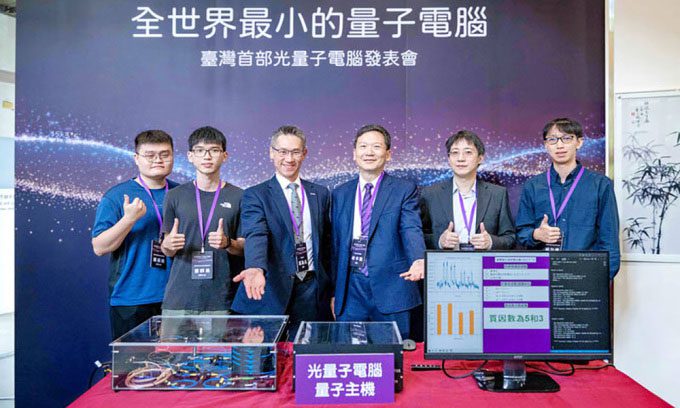The new quantum computer uses only a single photon and can operate at room temperature, marking a significant milestone in quantum technology.
A research team led by Professor Chuu Chih-sung from the Department of Physics and the Center for Quantum Science and Technology at National Tsing Hua University (NTHU) has developed the smallest quantum computer in the world, utilizing only a single photon, Taipei Times reported on October 17. The new research has been published in the journal Physical Review Applied.

Professor Chuu Chih-Sung (second from the right) with team members. (Photo: Hung Mei-hsiu/Taipei Times).
Chuu stated that they have addressed key obstacles in the development of quantum computers, including high energy costs and the operational environment requiring extremely low temperatures. A photon is the smallest particle of electromagnetic energy, and the research team has found a way to encode information in 32 time-bins, or dimensions, of a single photon.
According to Chuu, photons can be maintained in a stable quantum state even at room temperature. Quantum computers are typically prone to losing information and encountering computational errors due to vibrations or magnetic fields. However, photons have a wider transmission range and are less susceptible to interference, providing a unique advantage for the development of commercial quantum computers.
Traditional computers perform computations on circuit boards, while quantum computers transmit information through photons and compute using quantum physics. The smallest unit of digital information in traditional computers is the binary digit or bit, which can only represent 0 or 1.
In contrast, a quantum bit or qubit can process both 0 and 1 simultaneously. This property is known as quantum superposition. Superposition enables quantum computers to handle complex calculations, such as factorizing a number into its prime components or searching large datasets, up to 100 million times faster than traditional computers.
Kao Wei-yuan, president of NTHU, remarked that this new research is a significant milestone for quantum computing due to its compact design and ability to operate at room temperature. He noted that unlike the quantum computers in leading laboratories in the United States, this new photon-based small device does not require massive cooling systems, marking a noteworthy advancement in quantum technology.
The photon quantum computer is expected to have numerous applications, including drug development, logistics optimization, data security, and artificial intelligence (AI), according to Professor Mou Chung-yu, director of the School of Science at NTHU.


















































